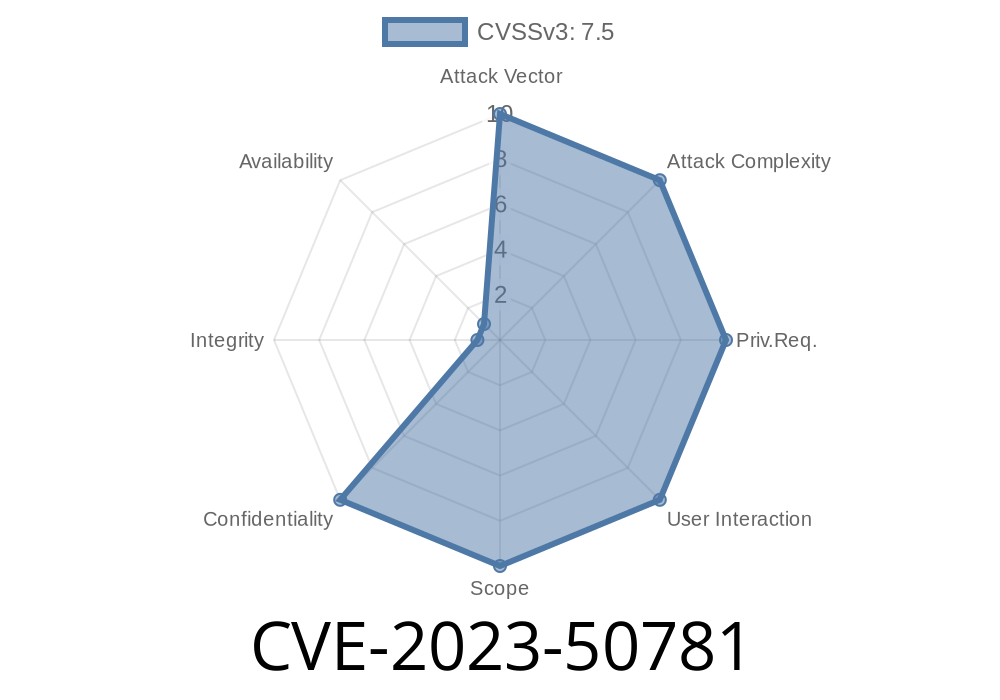In late 2023, a critical security flaw was discovered in M2Crypto—an old but still widely used Python cryptography library. This vulnerability, now tracked as CVE-2023-50781, makes it possible for remote attackers to decrypt encrypted messages from TLS servers using RSA key exchange. That means sensitive information you thought was safe could be easily exposed if your server or application relies on this library.
This post will explain how the flaw works, show real code snippets, demonstrate potential exploits, and give you everything you need to understand the risk—and how to fix it.
What’s the Problem?
M2Crypto, for a long time, supported TLS connections via RSA key exchange. In late 2023, security researchers discovered that M2Crypto doesn’t properly implement protections for RSA key exchange in TLS. As a result, attackers can carry out a “Bleichenbacher attack,” which is a classic method for breaking RSA encryption in TLS, and expose your secrets.
What’s at risk?
Any confidential data transmitted over TLS (like passwords, credit card info, or personal messages) can be decrypted by an attacker intercepting the traffic when M2Crypto’s flawed implementation is used.
How Does the Attack Work?
The classic Bleichenbacher attack dates back to the 199s. Here’s how CVE-2023-50781 revives it inside M2Crypto:
Client connects to server and starts a TLS handshake using RSA key exchange.
2. Attacker intercepts encrypted pre-master secret (the secret used to create the key for the session).
M2Crypto's TLS server implementation leaks information via error messages or response times.
4. The attacker sends many crafted requests, observing the server’s responses to guess the correct decryption.
5. Eventually, the attacker is able to decrypt the pre-master secret, break the session key, and then decrypt all captured messages.
Why is this still a problem?
Most modern TLS implementations don’t use RSA key exchange anymore—they use safer options like ECDHE. But M2Crypto did not disable RSA by default, nor did it implement the necessary countermeasures against these kinds of attacks.
Let’s see how a vulnerable server might look in Python using M2Crypto
from M2Crypto import SSL, m2
# Set up a context using RSA key exchange (default and vulnerable)
ctx = SSL.Context()
ctx.load_cert('server.crt')
ctx.load_key('server.key')
# This does NOT disable RSA key exchange or enable safe cipher suites
server = SSL.Connection(ctx)
server.setup_ssl('TLSv1', 'SSLv23_METHOD')
server.set_accept_state()
# ...rest of TLS server code...
The problem?
This setup allows RSA key exchange, and doesn’t enable strict cipher suite selection. If a client asks for an RSA key exchange, the flawed implementation gets used.
Craft many modified "invalid" handshake messages, sending them to the server.
3. Observe the server’s error responses (or response time). This “side channel” leaks information about whether the guessed decrypted values were correct.
Use it to decrypt previously captured traffic!
*A proof-of-concept script is available at:*
- https://github.com/tomato42/poc-bleichenbacher
*(This isn't specifically for M2Crypto, but demonstrates Bleichenbacher methods.)*
Note: Actually running an attack like this against production servers is illegal without permission!
Further References
- CVE-2023-50781 at NVD
- M2Crypto project on PyPI
- Original Bleichenbacher Attack Paper (PDF)
- Mitre’s CVE Record
Conclusion
CVE-2023-50781 in M2Crypto is a dangerous vulnerability, especially if your servers use RSA key exchange in TLS. Attackers can decrypt sensitive data just by observing network traffic. The best defense is to update, disable RSA key exchange, and switch to modern, safe configurations.
Stay safe, and keep your crypto libraries up to date!
If you want more details on this CVE or need help securing your servers, reach out to your security team or visit the references above.
Exclusive to our readers:
If you have legacy Python apps, now’s the time for a security audit. Don’t wait until your secrets are exposed!
Timeline
Published on: 02/05/2024 21:15:10 UTC
Last modified on: 02/26/2024 16:27:47 UTC
